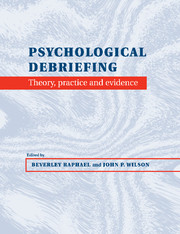Book contents
- Frontmatter
- Contents
- List of contributors
- Introduction and overview: Key issues in the conceptualization of debriefing
- Part I Key conceptual framework of debriefing
- Part II Debriefing: models, research and practice
- Part III Adaptations of debriefing models
- 16 Delayed debriefing: after a disaster
- 17 Debriefing in different cultural frameworks: responding to acute trauma in Australian Aboriginal contexts
- 18 The concept of debriefing and its application to staff dealing with life-threatening illnesses such as cancer, AIDS and other conditions
- 19 Traumatic childbirth and the role of debriefing
- 20 Debriefing health care staff after assaults by patients
- 21 Multiple stressor debriefing as a model for intervention
- Part IV Debriefing overview and future directions
- Conclusion: debriefing – science, belief and wisdom
- Index
19 - Traumatic childbirth and the role of debriefing
from Part III - Adaptations of debriefing models
Published online by Cambridge University Press: 06 January 2010
- Frontmatter
- Contents
- List of contributors
- Introduction and overview: Key issues in the conceptualization of debriefing
- Part I Key conceptual framework of debriefing
- Part II Debriefing: models, research and practice
- Part III Adaptations of debriefing models
- 16 Delayed debriefing: after a disaster
- 17 Debriefing in different cultural frameworks: responding to acute trauma in Australian Aboriginal contexts
- 18 The concept of debriefing and its application to staff dealing with life-threatening illnesses such as cancer, AIDS and other conditions
- 19 Traumatic childbirth and the role of debriefing
- 20 Debriefing health care staff after assaults by patients
- 21 Multiple stressor debriefing as a model for intervention
- Part IV Debriefing overview and future directions
- Conclusion: debriefing – science, belief and wisdom
- Index
Summary
EDITORIAL COMMENTS
This chapter considers the potential application of the debriefing model of intervention to women adversely affected by the experience of childbirth, particularly an occasion that might be traumatic. Boyce and Condon provide evidence suggesting that, although postnatal depression has been readily recognized, post-traumatic stress disorder (PTSD) can also occur, and may rarely be detected. They hypothesize that it may also significantly interfere with the mother's attachment to her new infant.
It is suggested that antenatal education could contribute to stress inoculation and have a preventive benefit, as does such training in other trauma situations. However, to date there is no evidence that, in its present form, it does. This may, however, also relate to the relevance of childbirth education, for its aim usually is to be reassuring and not to prepare the woman for potential but rare catastrophies. It may, therefore, be inappropriate in the specific sense, but it could prepare a woman to deal with the general rather than specific stressors, and provide coping strategies for these.
On the other hand, the work presented suggests that where the childbirth is traumatic, the opportunity for the woman to talk through her experience may be helpful, both perceived as such and potentially lessening her vulnerability. This reflects, the authors believe, good clinical care, and is probably best provided by the midwife or obstetrician, rather than trained debriefers who may not be able to answer the woman's questions about her experience and may provide a more pathological orientation to this experience.
Keywords
- Type
- Chapter
- Information
- Psychological DebriefingTheory, Practice and Evidence, pp. 272 - 280Publisher: Cambridge University PressPrint publication year: 2000
- 4
- Cited by



